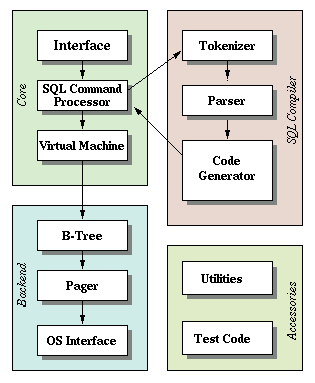Let's Build a Simple Database
Writing a sqlite clone from scratch in C
Part 2 - World's Simplest SQL Compiler and Virtual Machine
Part 1 - Introduction and Setting up the REPL
Part 3 - An In-Memory, Append-Only, Single-Table Database
We’re making a clone of sqlite. The “front-end” of sqlite is a SQL compiler that parses a string and outputs an internal representation called bytecode.
This bytecode is passed to the virtual machine, which executes it.
 |
Breaking things into two steps like this has a couple advantages:
- Reduces the complexity of each part (e.g. virtual machine does not worry about syntax errors)
- Allows compiling common queries once and caching the bytecode for improved performance
With this in mind, let’s refactor our main function and support two new keywords in the process:
int main(int argc, char* argv[]) {
InputBuffer* input_buffer = new_input_buffer();
while (true) {
print_prompt();
read_input(input_buffer);
- if (strcmp(input_buffer->buffer, ".exit") == 0) {
- exit(EXIT_SUCCESS);
- } else {
- printf("Unrecognized command '%s'.\n", input_buffer->buffer);
+ if (input_buffer->buffer[0] == '.') {
+ switch (do_meta_command(input_buffer)) {
+ case (META_COMMAND_SUCCESS):
+ continue;
+ case (META_COMMAND_UNRECOGNIZED_COMMAND):
+ printf("Unrecognized command '%s'\n", input_buffer->buffer);
+ continue;
+ }
}
+
+ Statement statement;
+ switch (prepare_statement(input_buffer, &statement)) {
+ case (PREPARE_SUCCESS):
+ break;
+ case (PREPARE_UNRECOGNIZED_STATEMENT):
+ printf("Unrecognized keyword at start of '%s'.\n",
+ input_buffer->buffer);
+ continue;
+ }
+
+ execute_statement(&statement);
+ printf("Executed.\n");
}
}
Non-SQL statements like .exit are called “meta-commands”. They all start with a dot, so we check for them and handle them in a separate function.
Next, we add a step that converts the line of input into our internal representation of a statement. This is our hacky version of the sqlite front-end.
Lastly, we pass the prepared statement to execute_statement. This function will eventually become our virtual machine.
Notice that two of our new functions return enums indicating success or failure:
typedef enum {
META_COMMAND_SUCCESS,
META_COMMAND_UNRECOGNIZED_COMMAND
} MetaCommandResult;
typedef enum { PREPARE_SUCCESS, PREPARE_UNRECOGNIZED_STATEMENT } PrepareResult;
“Unrecognized statement”? That seems a bit like an exception. I prefer not to use exceptions (and C doesn’t even support them), so I’m using enum result codes wherever practical. The C compiler will complain if my switch statement doesn’t handle a member of the enum, so we can feel a little more confident we handle every result of a function. Expect more result codes to be added in the future.
do_meta_command is just a wrapper for existing functionality that leaves room for more commands:
MetaCommandResult do_meta_command(InputBuffer* input_buffer) {
if (strcmp(input_buffer->buffer, ".exit") == 0) {
exit(EXIT_SUCCESS);
} else {
return META_COMMAND_UNRECOGNIZED_COMMAND;
}
}
Our “prepared statement” right now just contains an enum with two possible values. It will contain more data as we allow parameters in statements:
typedef enum { STATEMENT_INSERT, STATEMENT_SELECT } StatementType;
typedef struct {
StatementType type;
} Statement;
prepare_statement (our “SQL Compiler”) does not understand SQL right now. In fact, it only understands two words:
PrepareResult prepare_statement(InputBuffer* input_buffer,
Statement* statement) {
if (strncmp(input_buffer->buffer, "insert", 6) == 0) {
statement->type = STATEMENT_INSERT;
return PREPARE_SUCCESS;
}
if (strcmp(input_buffer->buffer, "select") == 0) {
statement->type = STATEMENT_SELECT;
return PREPARE_SUCCESS;
}
return PREPARE_UNRECOGNIZED_STATEMENT;
}
Note that we use strncmp for “insert” since the “insert” keyword will be followed by data. (e.g. insert 1 cstack foo@bar.com)
Lastly, execute_statement contains a few stubs:
void execute_statement(Statement* statement) {
switch (statement->type) {
case (STATEMENT_INSERT):
printf("This is where we would do an insert.\n");
break;
case (STATEMENT_SELECT):
printf("This is where we would do a select.\n");
break;
}
}
Note that it doesn’t return any error codes because there’s nothing that could go wrong yet.
With these refactors, we now recognize two new keywords!
~ ./db
db > insert foo bar
This is where we would do an insert.
Executed.
db > delete foo
Unrecognized keyword at start of 'delete foo'.
db > select
This is where we would do a select.
Executed.
db > .tables
Unrecognized command '.tables'
db > .exit
~
The skeleton of our database is taking shape… wouldn’t it be nice if it stored data? In the next part, we’ll implement insert and select, creating the world’s worst data store. In the mean time, here’s the entire diff from this part:
@@ -10,6 +10,23 @@ struct InputBuffer_t {
} InputBuffer;
+typedef enum {
+ META_COMMAND_SUCCESS,
+ META_COMMAND_UNRECOGNIZED_COMMAND
+} MetaCommandResult;
+
+typedef enum { PREPARE_SUCCESS, PREPARE_UNRECOGNIZED_STATEMENT } PrepareResult;
+
+typedef enum { STATEMENT_INSERT, STATEMENT_SELECT } StatementType;
+
+typedef struct {
+ StatementType type;
+} Statement;
+
InputBuffer* new_input_buffer() {
InputBuffer* input_buffer = malloc(sizeof(InputBuffer));
input_buffer->buffer = NULL;
@@ -40,17 +57,67 @@ void close_input_buffer(InputBuffer* input_buffer) {
free(input_buffer);
}
+MetaCommandResult do_meta_command(InputBuffer* input_buffer) {
+ if (strcmp(input_buffer->buffer, ".exit") == 0) {
+ close_input_buffer(input_buffer);
+ exit(EXIT_SUCCESS);
+ } else {
+ return META_COMMAND_UNRECOGNIZED_COMMAND;
+ }
+}
+
+PrepareResult prepare_statement(InputBuffer* input_buffer,
+ Statement* statement) {
+ if (strncmp(input_buffer->buffer, "insert", 6) == 0) {
+ statement->type = STATEMENT_INSERT;
+ return PREPARE_SUCCESS;
+ }
+ if (strcmp(input_buffer->buffer, "select") == 0) {
+ statement->type = STATEMENT_SELECT;
+ return PREPARE_SUCCESS;
+ }
+
+ return PREPARE_UNRECOGNIZED_STATEMENT;
+}
+
+void execute_statement(Statement* statement) {
+ switch (statement->type) {
+ case (STATEMENT_INSERT):
+ printf("This is where we would do an insert.\n");
+ break;
+ case (STATEMENT_SELECT):
+ printf("This is where we would do a select.\n");
+ break;
+ }
+}
+
int main(int argc, char* argv[]) {
InputBuffer* input_buffer = new_input_buffer();
while (true) {
print_prompt();
read_input(input_buffer);
- if (strcmp(input_buffer->buffer, ".exit") == 0) {
- close_input_buffer(input_buffer);
- exit(EXIT_SUCCESS);
- } else {
- printf("Unrecognized command '%s'.\n", input_buffer->buffer);
+ if (input_buffer->buffer[0] == '.') {
+ switch (do_meta_command(input_buffer)) {
+ case (META_COMMAND_SUCCESS):
+ continue;
+ case (META_COMMAND_UNRECOGNIZED_COMMAND):
+ printf("Unrecognized command '%s'\n", input_buffer->buffer);
+ continue;
+ }
}
+
+ Statement statement;
+ switch (prepare_statement(input_buffer, &statement)) {
+ case (PREPARE_SUCCESS):
+ break;
+ case (PREPARE_UNRECOGNIZED_STATEMENT):
+ printf("Unrecognized keyword at start of '%s'.\n",
+ input_buffer->buffer);
+ continue;
+ }
+
+ execute_statement(&statement);
+ printf("Executed.\n");
}
}